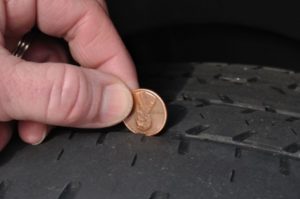Driving in winter weather is much different than driving in your average rainstorm. Snow, ice, and poor visibility can all contribute to hazardous conditions as well as reducing traction on the road. Here are our top winter driving tips to help you and your family stay safe this season.
Top Winter Driving Tips
These tips can not only help you stay safe while driving this season, but they can help your car stay in top condition year-round so you’ll be prepared for whatever surprises the weather may hold.
Pack an Emergency Kit
Emergency kits are a good idea to have in your car at all times, but they can be especially handy during the winter. A well-stocked emergency kit can make a huge difference if you become stranded on the side of the road.
If you already have an emergency kit, all you need to do to get it winter-ready is add a few items to your emergency kit. These items may include:
- Snow shovel
- Ice scraper
- Salt
- Sand
- A blanket
- Boots
- Gloves
Not sure what else to pack in your kit? Check out our blog about what to have an emergency kit here»
Check Your Tires
 When the thermometer starts to dip towards the freezing line, it’s a good time to check on your tires.
When the thermometer starts to dip towards the freezing line, it’s a good time to check on your tires.
Look at the tread on your tires and use the ‘penny test’ to judge whether it’s time to get replacements. Turn the penny so that Lincoln’s head is facing you and place the end into the tread. If you can see the top of his head, then it may be time to get new tires.
Check the inflation on your tires. Your owner’s manual and the tires themselves will list the recommended PSI for the tires on your particular vehicle. Tires naturally lose some air with cooler weather, and underinflated tires can not only lead to uneven wearing, they can reduce the amount of traction and decrease the fuel efficiency of your vehicle.
Get a New Battery as Needed
The maximum life of your battery will vary depending on where you live. If you live in a colder climate, you can generally expect batteries to last 3 – 4 years. In warmer climates, such as Atlanta, most batteries last between 4 – 5 years.
If your battery is reaching the end of its lifespan, it may be a good idea to replace the battery before it gives out unexpectedly. Most mechanics and auto shops can test your battery to determine how much charge is remaining.
Drive to Fit the Conditions
 When visibility is poor and conditions are slick, it’s usually a good idea to slow down and exercise more caution. Use your best judgment and stay safe during inclement weather!
When visibility is poor and conditions are slick, it’s usually a good idea to slow down and exercise more caution. Use your best judgment and stay safe during inclement weather!
Give yourself extra time to get to your destination if you expect heavy traffic or challenging driving conditions.
Change Your Windshield Wipers
On average, most windshield wipers last about six months before they need replacement. By changing your windshield wiper blades twice a year – once in the fall and again in the spring – you’ll always be ready for whatever the weather may hold.
Keep Your Gas Tank Above Half Full
 Keeping your gas tank above the half full mark has a few different benefits. For one, you can prevent long term damage to your vehicle. Condensation collects in the gas tank during colder temperatures and may lead to rusting. However, if your gas tank is at least half full, the gasoline itself absorbs any excess moisture and prevents this problem from developing.
Keeping your gas tank above the half full mark has a few different benefits. For one, you can prevent long term damage to your vehicle. Condensation collects in the gas tank during colder temperatures and may lead to rusting. However, if your gas tank is at least half full, the gasoline itself absorbs any excess moisture and prevents this problem from developing.
In case you get stuck in snow or ice, having a mostly full gas tank will make your wait for emergency services considerably more comfortable too. Sure, you may have to visit the gas station more often than usual, but you can rest easy that you’ll never run out of gas at an inopportune moment!
Have Your Car Inspected at T3 Atlanta
Although Atlanta doesn’t have the regular heavy snows of northern states, we do get unexpected ice storms now and again! Don’t let a preventable issue leave you stranded on the side of the road. Make an appointment with T3 Atlanta so you can rest assured that your vehicle is in top condition to handle any unexpected winter storm.










Leave a Reply
You must be logged in to post a comment.